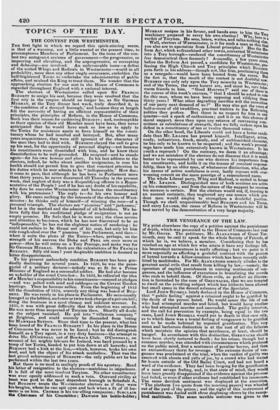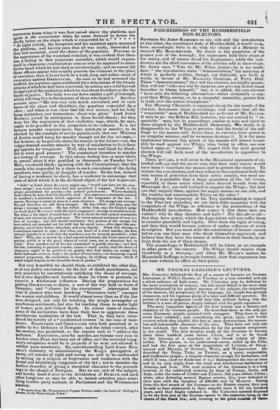THE VENGEANCE OF THE LAW.
WE print elsewhere the copy of a petition against the punishment of death, which was presented to the house of Commons last year by Mr. GROTE. The petitioner, Mr. ALEXANDER of Great Yar- mouth, may be said to speak for the whole Society of Friends, of which he is, we believe, a member. Considering that he has reached an age at which few who attain it have any feelings left, Ins benevolent earnestness is really affecting ; but we point to it more especially as affording a grateful contrast with the passion of hatred towards a fellow-creature which has been recently exhi- bited by multitudes. For Mr. ALEXANDER scarcely alludes to the greatest social evils that result from killing by law,—namely, the operation of capital punishment in nursing sentiments of ven- geance, and the influence of executions in brutalizing the crowds who rush to behold them. Of these evils, so perfect an illustra- tion is furnished by the case of GREENACRE, that we are tempted to dwell on the revolting subject which has hitherto been allowed but small space in the decent columns of the Spectator. Lord JOHN RUSSELL lately declared in the House of Commons, that " public feeling" against a criminal ought to be gratified by the death of the person hated. Ile would spare the life of one who had attempted murder and failed, but would hang another who had attempted murder and succeeded. The guilty intention, and the call for prevention by example, being equal in the two cases, Lord JOHN RUSSELL would put to death in that case only, as to which there was a brutal feeling of vengeance to be gratified and to be made habitual by repeated gratification. This very mean and barbarous distinction is at the root of all the fallacies which maintain the opinion that murderers, at least, should be hanged. In accordance with this distinction, GREEN ACRE Should have been slowly tortured to death ; for his crime, though but a common murder, was attended with circumstances which produced cm the public mind, first a sentiment of peculiar horror, and then
an extraordinary thirst for revenge. The extreme desire of ven- geance was proclaimed at the trial, when the verdict of guilty was received with shouts and yells of joy, by a crowd who had waited for hours outside of the Old Bailey Court, and had not heard a word of the evidence. They had been longing for the gratification of a most savage feeling, and, in that state of mind, they would have been greatly disappointed if the evidence against the prisoner had failed, or even if other evidence had established his innocence. The same devilish sentiment was displayed at the execution. " The platform (we quote from the morning papers] was wheeled out of the yard of the prison ; and the sight of this instrument of
punishment was hailed with three deafening cheers by the assem- bled multitude. The same terrible welcome was given to the
transverse beam when it was first raised above the platform, and
agat'n to the executioner when he came forward to fasten the deadly.balter on the chain which is suspended for it." * * * * * 4' At eight o'clock, the hangman and his assistant again mounted the platform, and having seen that all was ready, descended as they had mounted, amid the cheers of the populace. Previous to the appearance of the wretched criminal, it was evident that there was a feeling in that numerous assembly, which would express itself in clamorous exultation as soon as ever he appeared to atone forthe blood which he had shed so unrelentingly; and no sooner did those officers appear who usually precede the criminal to the place of execution, than it burst forth in a loud, deep, and sullen shout of execration against GREENACRE. As soon as he had mounted the scaffold, the populace again exhibited their detestation of the bloody atrocity of which he had been convicted, by setting up a wild hurrah in approval of the retaliation which he was about to endure under the hands of j ustice. The body was cut down amidst a yell of triumph, which will long live in the memory of those who beard it. Another account says—" He was very very much convulsed, and at each heave of the chest and shoulders, the populace responded by a cheer ; and when it was clear that life was extinct, and his body Lung motionless, one tremendous cheer was given 'S Lord JOHN RUSSELL joined by anticipation in those horrid cheers ; for they were but the expression of that vindictive rage which, he says, ought to be gratified in due proportion to its violence. It is not because murder requires more, than attempts at murder, to be checked by the example of severe punishment, that our Minister of Justice would hang for murder though not for the attempt,— but because, as he gravely states his reason, in the former case, the vulgar demand another murder by way of satisfaction to their hun- gry appetite for vengeance. Well, they have bad blood for blood ; but to what good purpose? The commonest incentive to murder is a feeling of revenge. is this odious feeling less or more likely to prevail since it was gratified in thousands on Tuesday last ? More, we should think; agreeing with the Constitutional, that the crowds who responded by a cheer to each convulsion of the dying murderer, were guilty, in thought. of murder. So the law, instead of having a tendency to check, has a tendency to encourage that state of mind which it is the declared object of the law to prevent.
44 Still," as Lord JOHN RessELL might say, "would you have let the mur. derer escape? you would have had biro punished, I suppose. Death is the proper punishment for murder—the natural punishment. Whoso sherldeth man's blood, by man shall his blood be shed : this expresses a sentiment natural to mankind ; a sentiment which approves of the vengeance of the law. I answer, Revenge is sweet to man in a state of nature. All savages are revenge- ful, and therefore we call them savages. He has killed : kill him, says the savage ; revenge is sweet. He has killed: strike him, says the English judge (or Lord Jolts RUSSELL] with the law's vengeance'; revenge is natural to man. But what is the object of social laws? It is to cheek the bad natural sentiments of men, and encourage the good ones. The worst natural sentiment of man is a love of revenge ; and this brutal sentiment, this passion of the savage, the laws which are intended not for wild but for social men' —this tiger-like pro- pensity, social laws flatter, stimulate, and even dignify. Allow that revenge is a sentiment natural to man ; that when one hears of a cruel murder, the first natural impulse is to wish that the murderer may he severely punished ; what then ? Why, one is moved by a bad natural sentiment, the worst natural pro. pensity, which it is the great object of social laws, not to stimulate, but to crush. Four murders out of five are committed to gratify revenge ; and then the law, intending to prevent murder, comes m teach society that the desire of vengeance ought to be gratified—to gratify that foul desire—to render the desire habitual—even to weaken the power of conscienee,—to discourage a good natural propensity, the inclination to forgive, by clothing revenge, which if naked might disgust, in the beautiful dress of justice."'
Not very beautiful, we should think, as exhibited the other day, or at any public execution ; for the law of death punishment, not only promotes by ostentatiously satisfying the desire of revenge, but it also degrades and hardens those on whom it pretends to
exercise a wholesome influence. During the preparations for putting GREENACRE to death, a sort of fair was held in front of Newgate; and "cheers for the executioner" interrupted the cries of piemen who were hawking " Greenacre tarts" amongst the women and children. It would almost seem then as if the raw were designed, not only for teaching the people revengeful or murderous sentiments, but also for teaching them to make light of human pain and violent death. In recent cases of murder, some of the authorities have done their best to aggravate these mischievous tendencies of the law. That is, they have intro- duced the novelty of a" condemned sermon" in the case of mur- derers. PEGSWORTH and GREENACRE were both preached at in public by the Ordinary of Newgate; arid the latter convict, after the sermon, was permitted, so the reports said, to " address the audience." Executions, save for murder, are become very rare in London since PEEL has been out of office, and the reverend hang- man's occupation would be in jeopardy if he were not allowed to exhibit upon murderers. So, notwithstanding Lord JOHN Rus- sau.'s clemency in administering the King's prerogative of mercy, all notions of right and wrong are still to be confounded by mixing up a religion of forgiveness and tenderness with the brutal and brutalizing vengeance of the law ; not to mention the further absurdity of giving a theatrical character to the proceed- ings in the chapel of Newgate. But we are sick of the subject, and hereby hand it over to the Archbishop of DUBLIN, and such other lawgivers as may be able to bestow attention upon some- thing besides party contests in Parliament and the Westminster election.
• We quote from Mr. WARE/111.1AI POplIkil POMO, under time head of" Killing for Murder, or the Terror-struck Town."



























 Previous page
Previous page